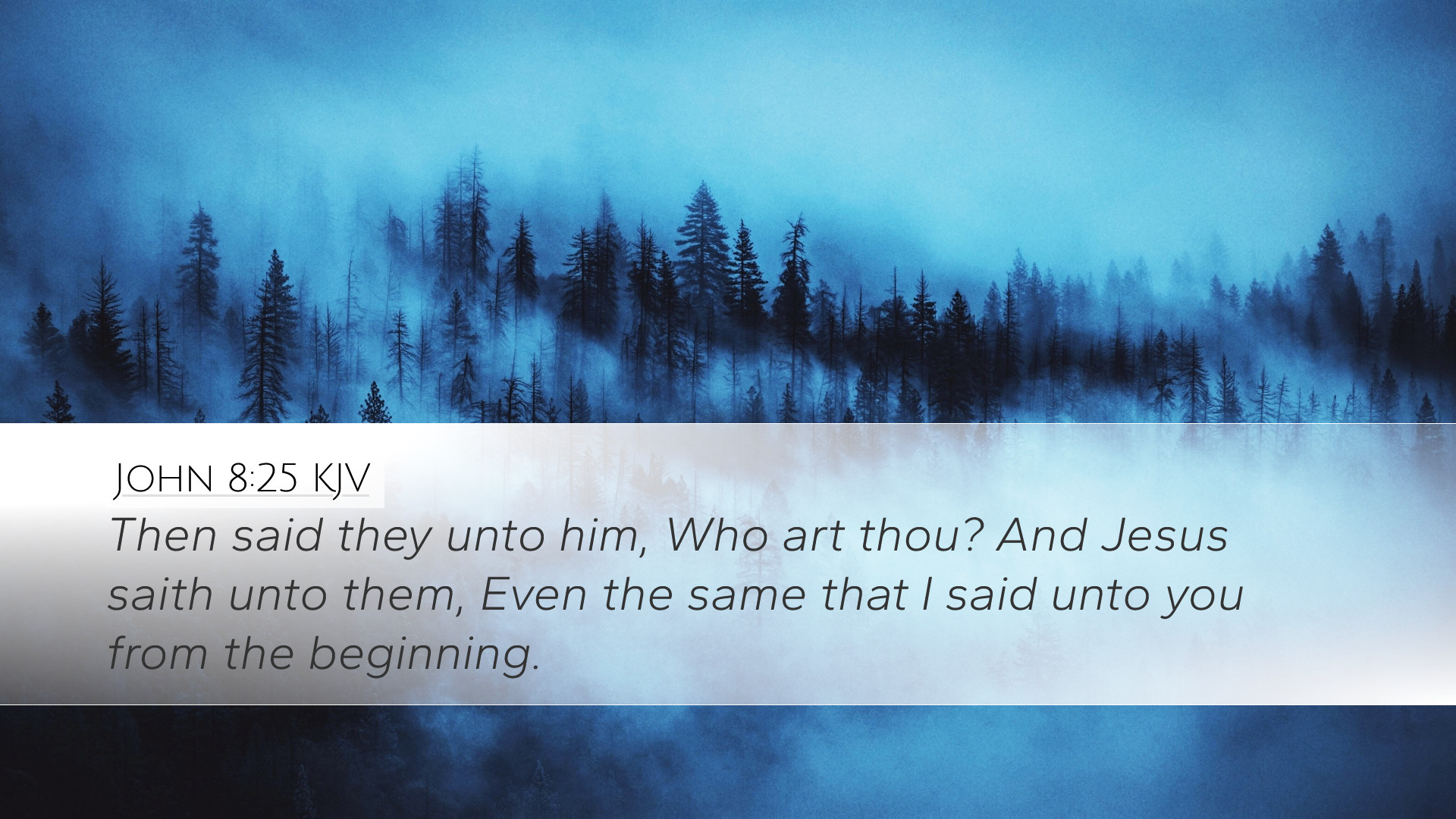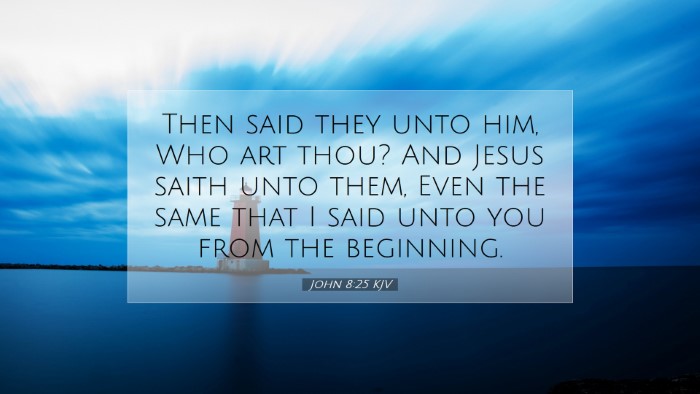Bible Commentary on John 8:25
Verse Context: John 8:25 states, “They said therefore unto him, Who art thou? And Jesus said unto them, Even the same that I said unto you from the beginning.” This moment in the Gospel of John highlights a critical confrontation between Jesus and the religious authorities, setting the stage for deeper theological insights into His identity and mission.
Commentary Insights
Matthew Henry's Commentary
Matthew Henry focuses on the persistent question of the Jewish leaders regarding who Jesus is. The question, “Who art thou?” reflects not only their skepticism but also their inability to grasp the significance of His words and actions. Henry notes that Jesus’ identity is fundamentally tied to His divine mission. He stresses the importance of recognizing Jesus as the fulfillment of Old Testament prophecies. His continual emphasis on self-revelation is seen in the phrase, "Even the same that I said unto you from the beginning," implying consistency in His message.
Henry highlights the idea that Jesus was revealing not just His identity but also the nature of His teachings, which standalone in authority. He emphasizes that Jesus is, in essence, the eternal Word of God who has existed since the beginning, thus giving profound weight to His declarations throughout the Gospel.
Moreover, Henry reflects on the obstinacy of the Jewish leaders who ask this question repeatedly, indicating their spiritual blindness and unwillingness to accept the truth. This interaction is pivotal in understanding the dynamics of belief and disbelief, showcasing how revelation can coexist with rejection.
Albert Barnes' Notes
Albert Barnes provides additional context by examining the nature of the inquiry posed by the Pharisees. He notes that they were likely trying to press Jesus regarding His authority, seeking to challenge His claims. Barnes interprets Jesus’ calm reply as a testament to His steadfastness and the clarity with which He presents His identity as the Messiah.
Barnes expands on the symbolism of Jesus referring to Himself in a continuous manner as "the same." This reinforces the concept that Jesus’ identity and message have not changed despite the various reactions from the crowd and religious leaders. Such a view aligns with the Johannine theme of the eternal nature of Christ, rooted in His divine essence.
The verse encapsulates the tension between divine revelation and human disbelief. Barnes highlights that the stubbornness of the leaders represented a broader theme in John's Gospel—the struggle between light and darkness, faith and skepticism. He encourages readers to reflect on how they perceive and respond to reveal truth in their own lives.
Adam Clarke's Commentary
Adam Clarke provides a thorough exegesis of the text by investigating the deeper meanings behind the term “Who art thou?” He sees this as a reflection not only of curiosity but also of challenge, where the leaders sought to undermine Jesus’ authority. Clarke analyzes the implications of Jesus’ identity as being profound: He is the one who has, from the beginning, made His intention known.
Clarke points out that the question posed by the Jewish leaders parallels the broader existential questions faced by humanity regarding the identity and nature of Christ. By restating His message, Jesus invites them into a deeper theological understanding of who He is—the incarnate God. Clarke highlights that this interaction is a crucial point in Christology, emphasizing the absolute necessity of recognizing Jesus’ true nature.
Furthermore, Clarke notes the theological implications of understanding Jesus as the “same.” It speaks to the unchangeable character of Christ and invites believers to trust in His eternal and unaltered nature. This call to trust is as relevant today as it was during Jesus’ earthly ministry, providing a firm foundation for faith amidst uncertainties.
Theological Reflection
This passage encapsulates the ongoing struggle between human perception and divine revelation. Each commentator emphasizes the need for personal acknowledgment of Jesus’ identity. The multi-faceted nature of who Jesus claims to be cannot be overstated—it challenges scholars and laypersons alike to confront their own beliefs, biases, and understanding of Christ.
In theological circles, this verse encourages discussions on Christology and the nature of revelation. How we answer the question, “Who is Jesus?” shapes our faith and informs our practice. As noted by the commentators, the continual revelation of Jesus is essential for building a robust Christian faith.
Application for Today
- Encountering Jesus: Just as the religious leaders of His time were confronted with the question of His identity, we are invited to consider our own responses to Jesus. Are we embracing His authority in our lives?
- The Importance of Identity: Understanding Jesus’ true identity is critical not only for personal faith but also for effective ministry. As pastors, students, and scholars, we must seek a deeper grasp of who Christ is to represent Him authentically to others.
- God’s Consistent Revelation: We are reminded that Jesus’ identity has been established since the beginning. In a world full of change and uncertainty, His unchanging nature offers a solid foundation for our faith and practice.
Conclusion
Ultimately, John 8:25 is more than just a question posed by Jesus' adversaries; it reflects a crucial theological dialogue about identity, authority, and the nature of belief itself. By synthesizing insights from noteworthy commentaries, readers are called to engage with the text thoughtfully, consider Jesus' claims earnestly, and respond sincerely. This passage lays a significant theological groundwork, urging us to look beyond surface-level inquiries into the profound realities of Jesus Christ, the eternal Word made flesh.


